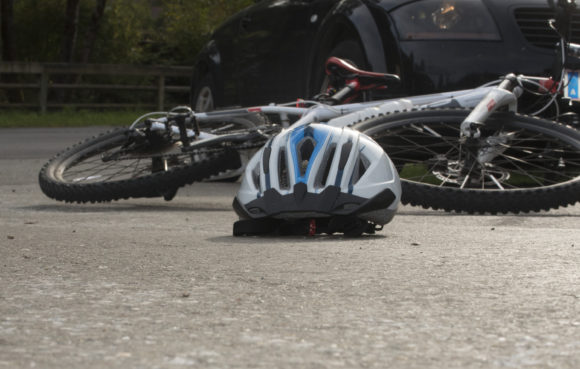GEICO Indemnity Co.’s refusal to settle a bodily injury claim for $30,000 will cost it more than $2.7 million, under a ruling Monday by the Georgia Supreme Court.
The high court’s 7-0 decision answered three certified questions posed to it by a federal appellate court, effectively finding that GEICO is liable for bad faith under Georgia insurance law. The ruling clears the way for the 11th Circuit Court of Appeals to order GEICO to pay a jury award in favor of an injured bicyclist.
In February 2012, Bonnie Winslett struck Terry Guthrie’s bicycle while driving her friend Karen Griffis’ Ford Explorer to a store, causing back and neck injuries. GEICO insured Griffis’ vehicle. The insurer wrote a letter to Winslett stating that she was insured by the policy and that GEICO was responsible for the accident, but didn’t give her any other instructions.
Guthrie’s attorney demanded that GEICO settle his client’s claim by paying the $30,000 limit of Griffis’ policy. GEICO offered $12,409.
Guthrie’s lawyer never responded to that offer. Instead, he filed a lawsuit against Winsett. A paralegal for the lawyer told her to notify GEICO about the suit, but Winslett never did. She discarded the summons and failed to appear in court.
That decision set in motion a series of events that brought Guthrie’s bodily injury claim right back to GEICO.
The Muscogee County Superior Court entered default judgment of $2,916,204 against Winslett. Guthrie filed a petition that forced Winsett into involuntary bankruptcy. The bankruptcy trustee, Fife Whiteside, filed a lawsuit in federal court alleging that GEICO negligently or in bad faith failed to settle Guthrie’s claim against Winslett.
A jury for the U.S. District Court in Columbus found that GEICO acted in bad faith by failing to pay Guthrie’s $30,000 settlement offer and assigned 70% of the liability for the default judgment to the carrier. Winslett was blamed for the remaining 30%.
Under Georgia law, a carrier that refuses to accept a reasonable settlement offer can be held liable for damages in excess of the policy limit. With interest, the judgment in favor of Winslett’s bankruptcy estate is worth $2.7 million, according to the Supreme Court’s opinion.
GEICO appealed, which prompted a panel of the 11th Circuit to ask the Georgia Supreme Court three questions. In summary, those were:
- When an insurer has no notice of a lawsuit against its insured, does Georgia law relieve the insurer of liability from a follow-on suit for bad faith?
- If the notice provisions do not bar liability for a bad-faith claim, can an insured sue the insurer for bad faith, when after the insurer refused to settle but before judgment was entered against the insured, the insured lost coverage for failure to comply with a notice provision?
- Does a party have the right to contest actual damages in a follow-on suit for bad faith if that party has no prior notice of or participation in the original suit?
GEICO argued that it should not be held liable because it received no notice of the lawsuit against Winslett, but the Supreme Court said the carrier should have paid better attention.
GEICO’s adjuster did not advise Winslett to notify it of any legal documents she received, even though its claims manual advises adjusters to do so, the court said. What’s more, the carrier could have foreseen that Winslett was unstable. She had been cited for driving without a license and was living in an apartment with no electricity and no furniture, other than a mattress on the floor.
The Supreme Court answered the 11th Circuit’s first and second questions with a “qualified” yes. The court said the the questions may have been answered differently under a different set of facts.
The Supreme Court answered the third question with a firm “no.” Georgia law clearly makes insurers that wrongfully refuse to settle a claim liable for damages equal to the amount of any judgment, regardless of whether that amount exceeds policy limits, the opinion says.
The ruling allows the 11th Circuit to issue a final ruling in the lawsuit filed by Winslett’s bankruptcy estate, which was filed by Columbus attorney Fife Whiteside. Whiteside declined to comment on the ruling.
Was this article valuable?
Here are more articles you may enjoy.


 Besieged Berkshire Utility Tries to Rewrite Who Pays for Wildfires
Besieged Berkshire Utility Tries to Rewrite Who Pays for Wildfires  Tesla’s Austin Robotaxis Report 14 Crashes in First Eight Months
Tesla’s Austin Robotaxis Report 14 Crashes in First Eight Months  When the Workplace Is Everywhere: The New Reality of Workers’ Comp Claims
When the Workplace Is Everywhere: The New Reality of Workers’ Comp Claims  Asbestos Lawsuits Prompt Vanderbilt Minerals to File Bankruptcy
Asbestos Lawsuits Prompt Vanderbilt Minerals to File Bankruptcy 